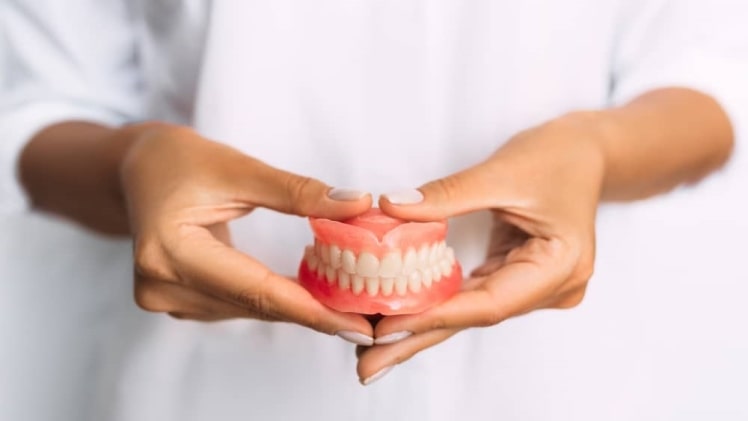Dentures are popular options dentists recommend for replacing missing teeth. People wear dentures/false teeth (artificial substitutes designed by prosthodontists to replace the lost/missing teeth and the surrounding gum tissues) to restore their smiles and remedy the various complications presented by natural teeth loss, such as; impaired speech and eating. Although constructed with the most natural-looking and durable materials, such as acrylic (plastic), dentures still cannot measure up to natural teeth, and wearing them takes some getting used to. As a result, there are certain problems that denture wearers often report experiencing with their dentures. Keep reading to learn more about these common denture problems and what their solutions are.
Mouth or gum irritation
The number one culprit for gum or mouth sores while wearing dentures is bacteria. Bacteria from food particles may cling to your dentures resulting in a build-up of microbial plaque or tartar. Anaesthetics like acetaminophen or ibuprofen can be used to reduce inflammation and pain. Also, rinsing your mouth with warm salt water can help to boost the healing process. Poorly fitted dentures can also irritate the soft tissues of the gum, causing raw spots. This problem can be remedied by having the right mobile denture repair company carry out some adjustments on your dentures.
Difficulties speaking and chewing.
People with newly fitted dentures often experience difficulty pronouncing certain words. These difficulties tend to go away after the wearer’s mouth has adjusted to the prosthetic device. In the meantime it is important to exercise patience and try things like speaking slower and try to practice speaking out challenging words daily. If you are also experiencing difficulty with chewing your food, you can try some practical solutions like; chewing slowly, taking smaller bites, avoiding sticky foods and opting for soft foods instead. With constant practice, you will ultimately regain the ability to eat anything you desire.
If your dentures however tend to move out of place each time you laugh or smile, then they are probably not the right fit and you will need to get them readjusted by a reliable mobile denture repair company.
Denture slippage
Dentures tend to move around in your mouth when they are not secured properly. When this happens, you can try to reposition the dentures by biting down and swallowing. Another way is to use a dental adhesive or liner to keep the dentures in place by providing a cushion in between the gums. Ensure that the use of any dental adhesive is done under the guidance of your dentist. Dental implants are also effective as they create a type of foundation that the denture can attach itself to. When none of these solutions work, the next best thing is to contact your dentist for an adjustment.
Infections
Improper denture care can cause infections like denture stomatitis and cheilitis. The best way to avoid these infections is by following proper denture care practices like immersing your dentures in lukewarm water or denture cleaner every night and brushing your dentures daily like your normal teeth. Visit your dentist immediately if you do end up with an infection.
Excess saliva
Newly fitted false teeth are foreign objects to the mouth and this can cause your salivary gland to produce greater levels of saliva than usual. As your mouth adjusts to your new teeth, your salivary gland will work normally again. Not much can be done about excess saliva. The denture wearer should just be prepared for increased saliva levels by swallowing more frequently.
Conclusion:
Dentures, although highly functional, still take a little getting used to. Adjustments and repairs may also be needed over time. Avoid trying to repair denture problems yourself; use a spare if available and schedule an appointment with your dentist to discuss possible repair options.

